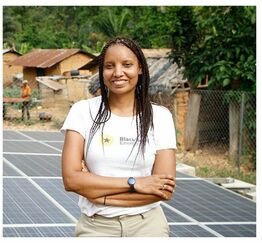|
Nicole Poindexter wasn’t aware of electricity poverty until a few years ago. Her background was in energy efficiency. She was an early employee of OPower, a software company that provides utilities, and their customers, better information about energy usage. After the company’s IPO, in 2014, Poindexter took a step back to consider what she wanted to do next. She quickly realized that her real interest was in creating “electrical grids that leveraged 100 percent renewable energy.”
|
More than 1.2 billion people worldwide live without access to electricity. Another 2 billion have limited electricity, just a few hours of often unreliable power a day. “It’s really hard for most of us to imagine a life without electricity,” explains Nicole Poindexter, an American entrepreneur in Africa with a background in finance. A graduate of Harvard Business School, Poindexter worked as a derivatives trader before leading business development at Opower, a software platform for utilities customers that was acquired by Oracle last year. She decided to start Black Star in 2015, after she began to learn about energy poverty. She recalled watching TV coverage about the Ebola epidemic and the difficulties treating the disease at a clinic in Liberia. “There was a lot of coughing in the background, and I was thinking, ‘That’s someone with Ebola,’” she said. “But that wasn’t what had happened. The clinic was full of people who had inhaled too much smoke - they had been burning wood and dung to boil water inside their home.”
|
Poindexter also recalls hearing about a baby who needed urgent care in the middle of the night, but the local clinic in the Ghanaian community of Kofihuikrom had no electricity, so the medical staff improvised with flashlights. As the doctor went to insert an IV, the flashlight’s batteries died. Eventually someone found a candle, and the IV was inserted by the light of a flame. “It’s simple: health care improves dramatically with electricity,” she says.
|
Every million dollars a company raises in venture capital delivers power to seven thousand people in Africa. - Nicole Poindexter, Founder and C.E.O. of Black Star |
But access to electricity is not just a health concern - it is also a food concern, and a transportation concern, and a communication and business and life concern as well. Even cocoa farming, which doesn’t require electricity, was limited because farmers had to cut short their days to hurry home to make dinner and do other household chores before darkness. Poindexter has seen these struggles firsthand in rural Ghana, where her startup is working to bring solar power to communities where highly flammable kerosene and expensive flashlight batteries are currently the primary source of light. In these small villages, Poindexter has seen both simple inconveniences and economic hardship that result from the lack of power.
|
As Poindexter researched her ideas, she came to understand the human and economic costs of “energy poverty” and realized that her ideas could do more than improve the environment. It could improve lives, at a cost that is less than the price of kerosene and battery alternatives. Still, it was difficult to take that step from idea to reality. “I got on a plane and showed up and said, ‘Hi, I would like to provide electricity,’” she recalls. “I expected them to say, ‘Okay, crazy lady, go away.’” Instead, Poindexter got an enthusiastic response on that first trip to Ghana, in March 2015, Black Star was born.
|
The company began its work in the region around Kumasi, Ghana, where Poindexter saw need, interest, and opportunity, but the company now has bigger plans in that country and throughout the continent. “This is a 600 million–person market. We could be a billion-dollar company if we were to just reach about two million people.” In October 2015, eight months after Poindexter’s first trip to Ghana, Black Star completed its first solar farm in a village near Kumasi. Two weeks after the power was turned on, Poindexter returned to visit the community. “There was a five-foot-high speaker that was blasting music and they were having a huge dance party, which they were never able to do before,” she says. “Electricity changes everything.” And in Kofihuikrom, another town that Black Star serves, Poindexter's company erected twenty-two solar panels. The local clinic no longer has to deliver babies by flashlight. The town chief was so excited that he initially left his lights on inside all night.
|
When solar energy first came to Africa, it was expensive and unreliable. Arne Jacobson, a professor of environmental-resources engineering at Humboldt State University, in California, works with and consults for Poindexter and others. "I started out by trying to understand the quality of the panels that had started to flood the market,” he said. Much of the technology had “big problems. Chinese panels, panels from the U.K., all this low-quality junk coming in. Later, L.E.D.s that failed in hours or days instead of lasting thousands of hours, as they should. People’s first experiences were often really bad.”
|
These first solar companies in Africa didn't understand their market. They asked customers to pay for everything up front, a forbidding prospect for many. “Cost is important to the customer, but risk is even more important,” says Poindexter. “A bad decision when you’re that poor can mean your kids don’t eat or go to school, which is why people tend to be conservative. And which is why kerosene was winning. There was no risk. You could buy it a tiny bit at a time.” Currency risks posed another problem: these first-mover companies and their venture investors treated the new microgrids as assets with a twenty-year life span ... in a country where inflation is highly unpredictable. “We just had an election in the U.S. with huge consequences for policy,” Poindexter notes. “But over here every election is like that.”
The new generation of solar-start-ups are finding creative solutions to their market/revenue problem. For instance, Off-Grid offers financing with monthly payments that are the exact same as what customers were paying for their kerosene. Other companies ask customers to put down about thirteen dollars to buy a starter kit: a panel, a battery, a few L.E.D. lights, a phone charger, and a radio; then they pay about eight dollars a month for three years, after which they own the products outright. The most popular systems allow their customers to pay their bill by phone. For instance, PEGAfrica, prints a unique bill-pay sequence on a wrist-bands that they give to customers. But these new solutions aren't frictionless either - to pay with a cell-phone, users have to click through multiple screens and then at the end they input a unique sixteen-digit bill-pay code. Poindexter noted early on that smart-phones simply aren't a great solution - many users don't read the language of the instructions, or the screen is small, and it’s probably scratched up. So Black Star sells scratch cards with unique number sequences that customers can input into their meter boxes at home in order to turn on the power-system.
Because one of the biggest obstacles to the growth of solar power in the region is the lack of available cash, many of these companies are essentially banks as well as utilities, providing loans to customers who may have no credit history. That can make it hard to figure out what to charge people. Lacking an established financial infrastructure, companies in sub-Saharan Africa are constantly experimenting with different plans: Off-Grid began by offering ten-year leases, but found that customers wanted to own their systems more quickly, and so the payments are now spread out over three years. PEGAfrica customers buy their system in twelve months, but the company gives them health insurance as a bonus. Poindexter's Black Star is a true utility: the customers in the communities where it builds microgrids pay the company for the electricity they use. And like a public utility in the US, her business model is evolving with the customers - as they steadily increase the amount of energy they buy, their wealth and health improves, and then pay for more electricity to power a television and then to power a small business.
The change that is happening in Ghana, brought by entrepreneurs like Poindexter, is reminiscent of Palo Alto or Mountain View, with new start-ups packed into offices that are filled with standing desks and glassed-in conference rooms for impromptu meetings. Erick Donasian, a colleague/competitor of Poindexter who shares the same mission to electrify Africa, has a deep appreciation for his new life in Africa - it is far less formal than the rest of the world where “you have to tuck your shirt in, which I hate.” Indeed, Silicon Valley's influence in Ghahan is clear in the untucked T-shirt Donasian often wears: “make something people want,” with the Y Combinator logo, Silicon Valley’s most famous incubator. The outsiders have been welcomed with open arms.
More importantly, the arrival of electricity is changing life in a way that is hard for Westerners to imagine. Light means differences in sleeping and eating patterns and an increased sense of safety. One Ghanaian traded in her kerosene lamp for five Off-Grid bulbs, including a security light outside her door that went on automatically when it got dark. “Crime is here,” Poindexter says, “but so are dangerous animals, especially snakes. So it’s good to have lights.” Parents are thrilled that their children can study at night. “You can see the effects of electricity on learning and their grades in school,” says one of Poindexter's customers. Several other customers have told her that they hoped to get classroom computers, and one planned to mechanize their well so that townspeople would no longer need to pump water by hand. Farmers in Ghana were getting daily weather reports from Farmerline, a Ghanaian information service that uses G.P.S. to customize the forecasts. “If a farmer puts fertilizer on the field and then it rains, he loses the fertilizer—it washes away,” Poindexter says. “And the farmers say that the climate is changing - they can’t predict the rain anymore. Usual rainfall patterns have shifted. They need access to Farmerline more than ever. Which means they desperately need access to electricity.”
The new generation of solar-start-ups are finding creative solutions to their market/revenue problem. For instance, Off-Grid offers financing with monthly payments that are the exact same as what customers were paying for their kerosene. Other companies ask customers to put down about thirteen dollars to buy a starter kit: a panel, a battery, a few L.E.D. lights, a phone charger, and a radio; then they pay about eight dollars a month for three years, after which they own the products outright. The most popular systems allow their customers to pay their bill by phone. For instance, PEGAfrica, prints a unique bill-pay sequence on a wrist-bands that they give to customers. But these new solutions aren't frictionless either - to pay with a cell-phone, users have to click through multiple screens and then at the end they input a unique sixteen-digit bill-pay code. Poindexter noted early on that smart-phones simply aren't a great solution - many users don't read the language of the instructions, or the screen is small, and it’s probably scratched up. So Black Star sells scratch cards with unique number sequences that customers can input into their meter boxes at home in order to turn on the power-system.
Because one of the biggest obstacles to the growth of solar power in the region is the lack of available cash, many of these companies are essentially banks as well as utilities, providing loans to customers who may have no credit history. That can make it hard to figure out what to charge people. Lacking an established financial infrastructure, companies in sub-Saharan Africa are constantly experimenting with different plans: Off-Grid began by offering ten-year leases, but found that customers wanted to own their systems more quickly, and so the payments are now spread out over three years. PEGAfrica customers buy their system in twelve months, but the company gives them health insurance as a bonus. Poindexter's Black Star is a true utility: the customers in the communities where it builds microgrids pay the company for the electricity they use. And like a public utility in the US, her business model is evolving with the customers - as they steadily increase the amount of energy they buy, their wealth and health improves, and then pay for more electricity to power a television and then to power a small business.
The change that is happening in Ghana, brought by entrepreneurs like Poindexter, is reminiscent of Palo Alto or Mountain View, with new start-ups packed into offices that are filled with standing desks and glassed-in conference rooms for impromptu meetings. Erick Donasian, a colleague/competitor of Poindexter who shares the same mission to electrify Africa, has a deep appreciation for his new life in Africa - it is far less formal than the rest of the world where “you have to tuck your shirt in, which I hate.” Indeed, Silicon Valley's influence in Ghahan is clear in the untucked T-shirt Donasian often wears: “make something people want,” with the Y Combinator logo, Silicon Valley’s most famous incubator. The outsiders have been welcomed with open arms.
More importantly, the arrival of electricity is changing life in a way that is hard for Westerners to imagine. Light means differences in sleeping and eating patterns and an increased sense of safety. One Ghanaian traded in her kerosene lamp for five Off-Grid bulbs, including a security light outside her door that went on automatically when it got dark. “Crime is here,” Poindexter says, “but so are dangerous animals, especially snakes. So it’s good to have lights.” Parents are thrilled that their children can study at night. “You can see the effects of electricity on learning and their grades in school,” says one of Poindexter's customers. Several other customers have told her that they hoped to get classroom computers, and one planned to mechanize their well so that townspeople would no longer need to pump water by hand. Farmers in Ghana were getting daily weather reports from Farmerline, a Ghanaian information service that uses G.P.S. to customize the forecasts. “If a farmer puts fertilizer on the field and then it rains, he loses the fertilizer—it washes away,” Poindexter says. “And the farmers say that the climate is changing - they can’t predict the rain anymore. Usual rainfall patterns have shifted. They need access to Farmerline more than ever. Which means they desperately need access to electricity.”





